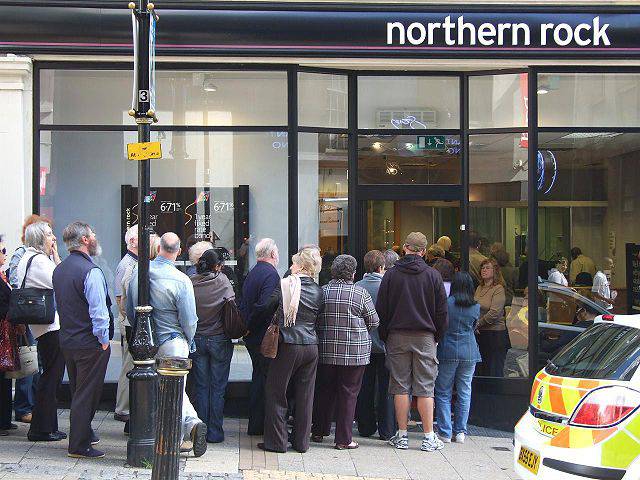This article is more than 1 year old
So why the hell do we bail banks out?
It's capitalism, stupid! You screw up then you lose everything
Bank on the run
As it happens people tend to want to lend out money for much shorter periods of time than people want to borrow it (it's also true that people tend to want larger, chunkier, loans than most lenders would be happy with but we can drop this risk pooling aspect in our explanation here).
Think for a moment: we tend to want to borrow for 30 years to buy a house. But who in hell, as a private saver that is, wants to lock up their cash for 30 years? Well, OK, maybe some people, but very few, and so the only people who could get a mortgage would be those who could find those few people.
So, what we want our intermediary to be able to do is something called "maturity transformation". That is, borrow money short term from people and then lend it out long term. The economist Brad Delong has been known to insist that this is the beating heart of banking. If you borrow short and lend long then you're a bank, if you don't, no matter what you call yourself, you're not.
The system we've ended up with (it started with goldsmiths lending out a bit of the gold they were storing for people and developed from there) has those banks borrowing from all sorts of places. From other banks (the overnight market), the bond markets, from our savings and even skimming from our cash flow. That last is called the float: If I'm paid £4,000 a month and I spend all of it over a month then, on average at least, my average balance is £2,000 a month (well, sorta, but you geddit, right?).
And this is true of the 30 million odd households of the UK. And the banks really do look at that and say, well, on average we've got 30 mill x £2,000 in the current accounts, great, we can wrap up that float and lend it as 30 year mortgages and 10 year leases on shiny new manufacturing plants etc. On top of all the other borrowings from bond markets and savings deposits, and so on.
All of which is absolutely great: we've done the maximum of maturity transformation that we can and this means that the maximum amount of savings is being mobilised in making the country richer in the future. You know, we're not leaving any cash mouldering in a safe deposit box somewhere.
However, while this is great it's also horribly, horribly, unsafe and fragile. Because when you and I come along to the bank asking for our money back, the bank hasn't got it. It's in the mortgage of the house down the road or the machine that we slave over at the office. Ooops!
So, the bank keeps some portion of all those deposits (in banking, our deposits are the loans that the bank has taken from us, what it has borrowed) in ready cash for when we want to hit the pub on a Friday. A couple of per cent maybe. This “reserve” gives the system it's name, fractional reserve banking. But what if 4 per cent of the people turn up asking for their cash back?

Birmingham Northern Rock bank run, 2007. Image credit: Lee Jordan – Flickr. Licensed under CC BY-SA 2.0
Ooops! The bank doesn't have it and goes bust with a milling mob outside screaming that all their cash has been lost.
It hasn't been lost: the bank has a liquidity problem, not a solvency one. It can pay everyone back, it just can't pay everyone today. And that's the first reason we bail out banks. The whole system, fractional reserve banking, is simply subject to the possibility of bank runs. The answer to which is that the central bank (which can just make more money) lends more to the bank suffering the run. And that bank must put up collateral (those loans and mortgages) and pay a high interest rate for that money.
Now, you can avoid this problem by having full reserve banking. Here, there's no maturity transformation. No borrowing short and lending long. So a run is simply never possible: people can only get their money back when they said they wanted it back. By which time that long term borrower should have paid back their loan. But we think that (OK, the vast majority of economists, perhaps) the benefits of maturity transformation are worth having to provide emergency liquidity.
The most important thing about such aid, though, is that the central bank should only provide it to banks which are solvent but illiquid. If they had time to sell everything then they could pay everyone back. So, sure, bridge the gap and she'll be fine.
When a bank is insolvent then sure, damn it and let it go bust. We do try to make sure that someone takes over the business, an orderly run down rather than just an implosion. Simply because an orderly transfer of what remains is helpful to those depositors who remain.
But if the directors have lost half the money investing in fur bearing trout farms then the hell with it, the shareholders lose all their money, the directors get fired and we pluck whatever is left out of the rubble of bankruptcy. And we do do this as well.
Lehman Brothers was insolvent (probably, it had huge losses on some California real estate deals) as well as being illiquid. Buh-Bye, shareholders! Northern Rock was slightly more arguable but Buh-Bye! Various Building Societies ... byeeeee!
